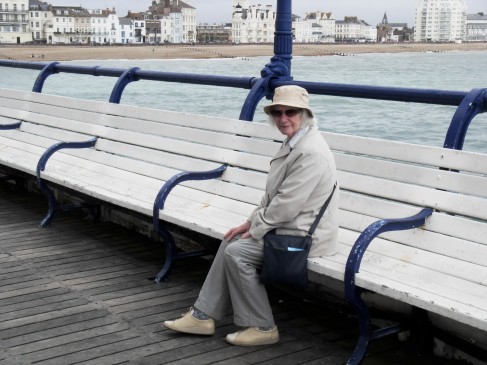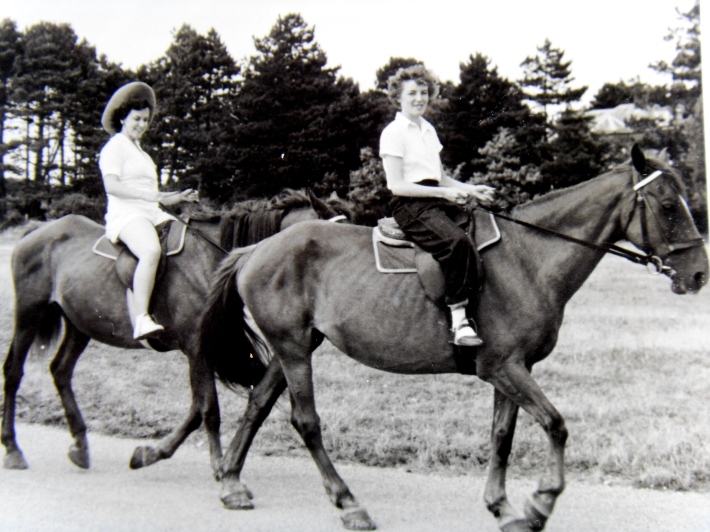Holiday? What Holiday?

We came home from a coach tour holiday to Eastbourne, and area, two weeks ago. We are just getting over it! In spite of the breaks, sitting on a coach for a long distance ride is hard on the base of my spine and pelvic bone area. I had to keep levering myself up to relieve the painful pressure. My blood pressure tends to drop too. Lightheaded, I nearly fell down the steps getting off. Most of us were over the limit for youthful expectations. In fact it seemed like a busload of dodderers when we were getting on and off. Otherwise, it was an interesting ride, especially the two days touring.
The hotel had one hundred rooms. Ours was on the fourth floor. However, they do have two small lifts (three passengers maximum). We used them occasionally to get to our room, at least the floor our room was on. For the exercise, we usually walked down the stairs and took the lift up, but only when ready to drop. Many of the guests had walking sticks or frames, even some of those used the stairs (don’t know how far up they were) so we had to go with the bulldog spirit and make an effort ourselves. Apart from which, there were queues for lifts at certain times.
When we first walked into our room I was pleasantly surprised. Nice bedcover and matching drapes. But the window was at the end and to the side. Loud noises came up from the side street, and from the seagulls on the roof. In the early hours of the morning (seemed like dawn) rubbish carts loudly collected the hotel refuse. The sound of smashing bottles was sleep-shattering indeed. Unfortunately the seats of the two chairs were painfully hard and so was the bed. Rolling from side to side to relief the pressure on my joints and trying to sleep on my back meant a poor night’s sleep. Other physical problems that kept the bathroom in use, only added to poor sleep.
An excellent thing about our accommodation was furniture that gave much drawer and hanging space. Good coat hangers too. A decent-sized TV stood on a set of drawers but we could not get BBC. Not a huge problem but we did want to see some of the Olympics. On the Sunday a man came to fix it but couldn’t. We asked the Receptionist if we could have a different TV. Another man came to fix the one we had and got it to work, most of the time.
Ah, the bathroom! It’s age reminded me of the house I was brought up in. Greenish streaks below the hot water taps, and the bath bottom as rough as sandpaper — or so it felt like. No shower in the bathroom but there was a shower room on each floor. With my arthritis, I had considerable difficulty getting out of the bath. Likely the narrowness of the tub. At least, the bathroom was clean. In fact, so was the bedroom, plus all the rooms we entered. Can’t complain there. And, after all, it was a low budget holiday.
The huge dining room. We had no choice but to sit where guided. We shared a rather small table with four others from our coach. The table was one of a number of others along the wall opposite the windows. It seemed the whole coach party was somewhat crammed in at that side. We were at the second sitting every day, every mealtime. Another coach party was before us and they were still sitting at their tables next to our party when we arrived for our meals. So what with other guests in the, what appeared to be, best side of the huge room with large windows giving natural light, the noise level seemed considerable. Being the last to be served every day made us feel like the poor relations. Although we had a simple choice of starters and main course, puddings could run out, and choice became restricted to what was left. One also got the impression that portions were cut to ease an occasional problem. (eg being the last to be served one evening, four of us had fruit cocktail made up of a scattering of small grapes and a few small bits — a teaspoonful in my case — of apple and melon. This meager portion of fruit swimming around in a lake of fruit juices. Yes, we could have complained but the pleasant staff were busy clearing tables and we were wanting to be off. Apart from which, we had complained earlier that week about our choice of pudding running out. On that occasion a bottle of wine was brought to our table the following day. We thanked them but refused. We didn’t want any wine. The waiters, all foreign were good workers and did there best — always with a smile. A reasonable choice for breakfast. I had Continental. I tried the porridge one day — not to my taste, heavy and tasteless. I rarely eat meat and tried to stick to the fish choice for the evening meal, but not if prawns and the like were included. Unfortunately, this was not usually mentioned and the first evening my plate arrived decorated with pink prawns — I soon had it removed. After that I asked first. On the whole, I did not expect more than what we got. Budgets were likely tight. The staff were accommodating.
My hubby took ill on the Sunday night, and in the morning the Receptionist was most helpful, explaining to us where we could find a doctor’s surgery located at the railway station. It was less than an hour’s wait to see the doctor and my hubby get the prescription for antibiotics needed to cure a problem resulting from a hospital visit a week earlier. However, what with the new problem to add to other disabilities (my own included) and sleep deprivation, it became a tiring holiday. Just sitting in the sun is not for either of us.
Oddly, one highlight was buying navy trousers that fit me beautifully, and a blue-patterned top, which goes well with a number of things in my wardrobe.
We had two enjoyable trips out. Both visited railway stations, which gave much pleasure especially to my hubby.
On the Monday we were taken on an excursion to the Bluebell Railway where we could visit the museum and enjoy refreshments. I think nostalgic chuffing trains, with whistles and dirty smoke tend to excite aging males more than us ladies. But I have to admit it took me on a backward journey to an age when phones were immobile and lived in red boxes, and train journeys had the excitement of ‘going places’, complete with smoky tunnels and, occasionally, steam coming from under the seat from leaky joints. Yes, and rocked by a lullaby of chuff–chuff –chuff from the engine chimney, and di-di-de-da.from the wheels passing over the rail joints. After the Bluebell Railway, we went on to Michelham Priory and gardens where we had lunch. The gardens were lovely, the café pleasant with good food, and the Priory was a ‘hands on’ museum. Visitors were encouraged to touch and handle, with no restriction on taking photographs.
The second trip took us to a winery where we tasted fine fruit wines and bought two bottles — ginger wine and cherry wine — and had cake and coffee to consume on the premises. We then visited a lovely old town called Tenterden where I bought a small present at an antique shop. We visited the steam railway there and my hubby had a look round the workshops. Then onwards to Bodium Castle. There was much activity going on. If seemed a themed fun day for children was taking place and people were enjoying both the sun and the games. We enjoyed tea and cream scones in the café and a pleasant walk round the grounds.
The following day we used our passes to take a bus to Brighten. It was sunny, hot and noisy. We were glad to get back to Eastbourne, even if that town is noisier than we expected. On one of the days off, we boarded the rattly-bumpy road train that travels the coast road between the Marina and Holywell. Oh boy! What a shake up, and long waits at most of the stops. But it gave us a chance to see the marina and also Holywell. The latter being well worth a visit and refreshments at the café there. We walked there from the hotel on another day.
Seagulls. Walking on the pier we saw a seagull land on a man’s head and try to peck the food being put in the man’s mouth. Another day, we nearly had our sandwiches snatched away. What a menace! However, we did manage to find a spot under cover where we were not so easily seen. They are beautiful clean creatures but I refer them at a distance. Not did we enjoy their screeching in the early hours when we wished to sleep.
Would we return to Eastbourne? I doubt it. But it was an interesting experience, made all the livelier by our witty, knowledgeable driver, Gordon..

























